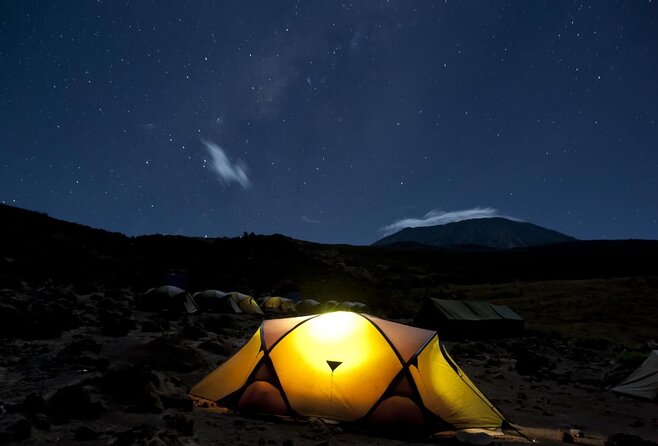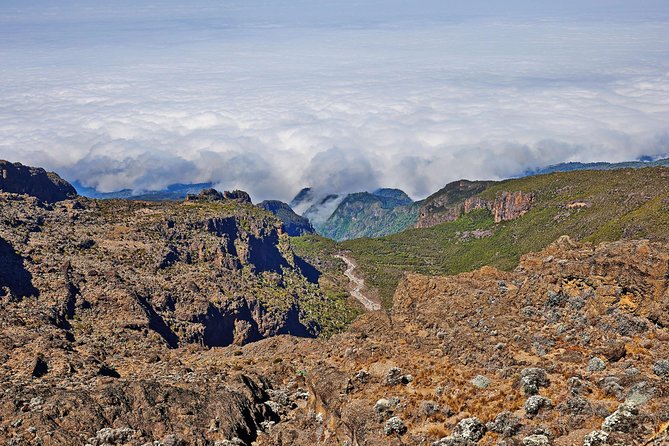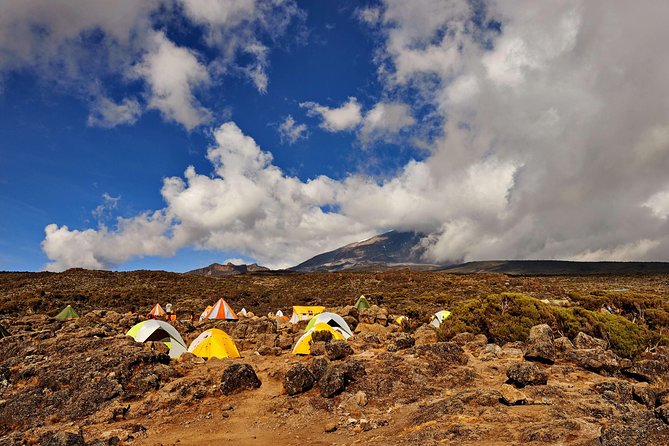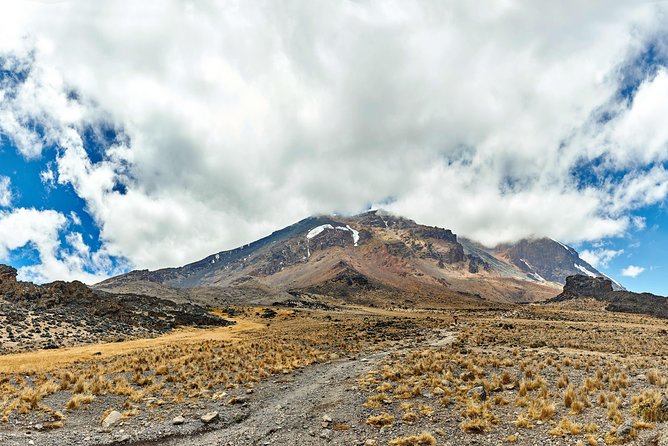Conquering the tallest free-standing mountain in Africa, Kilimanjaro, is a bucket-list dream for many adventure-seekers. The Rongai Route, a less-traveled path on the mountain’s northern side, offers a unique perspective on this iconic peak. Over six days, trekkers will traverse diverse landscapes, from verdant forests to otherworldly alpine deserts, before the ultimate challenge: scaling the summit at nearly 20,000 feet. With experienced guides, comfortable accommodations, and flexible meal options, this expedition promises a rewarding and safe adventure. But the real question is, are you ready to take on the Rongai Route and stand atop the "Roof of Africa"?
Key Points

- The Rongai route offers a 6-day Kilimanjaro climbing expedition from the northern side, known for its gradual ascent, less crowded trails, and scenic landscapes.
- The package includes accommodations at Aishi Machame Hotel and mountain tents, as well as high-quality group equipment and meals catering to various dietary needs.
- Experienced, certified Wilderness First Responder guides and a professional climbing crew ensure climber safety, with regular medical check-ups and emergency medical supplies.
- Travelers must arrange their own international flights and obtain a Tanzanian visa, and personal mountaineering gear is not provided but available for rental.
- Moderate physical fitness is recommended, with regular cardiovascular exercise and practice hiking with a loaded backpack to build endurance for the Kilimanjaro climb.
Overview and Route Details

The Rongai route on Kilimanjaro, Tanzania’s iconic mountain, offers a 6-day climbing expedition that commences from the northern side of the massif.
This private tour allows your group to embark on an unforgettable adventure, exploring the mountain’s diverse landscapes. The route is known for its gradual ascent, making it a popular choice for climbers seeking a less crowded and more scenic path to the summit.
Throughout the 6-day trek, you’ll encounter a range of ecosystems, from grasslands and forests to alpine deserts and the iconic glacial peaks.
With experienced guides leading the way, you can expect a safe and rewarding journey to the ‘Roof of Africa‘ at 5,895 meters (19,341 feet) above sea level.
You can also read our reviews of more tours and experiences in Moshi.
Included Accommodations

Along with the Kilimanjaro climbing experience, the package includes comprehensive accommodations to ensure a comfortable and supported trek.
Hikers will enjoy two nights at the Aishi Machame Hotel in Moshi, where they’ll share rooms with one other guest (solo climbers excluded).
On the mountain, climbers will stay in North Face VE-25 tents, with two hikers per tent (again, solo climbers excluded).
The package also includes all fees collected by Kilimanjaro National Park, as well as high-quality group equipment like dining tents, sleeping pads, tables, chairs, crockery, and cutlery.
Single accommodation is available at an additional charge for those who prefer private lodgings.
Meal and Dietary Options
What’s more, the climbing package provides three daily meals – breakfast, lunch, and dinner – to fuel participants throughout their Kilimanjaro journey.
These energy-rich meals offer a variety of options to cater to diverse dietary requirements, including vegetarian, vegan, lactose-free, gluten-free, and halal preferences.
Climbers can expect freshly prepared, nutritious fare, ranging from hearty porridge and freshly baked breads for breakfast to hot soups, stews, and rice dishes for lunch and dinner.
Drinks such as tea, coffee, juices, and soda are also included to keep the group hydrated.
The experienced cooks ensure that all dietary needs are met, allowing everyone to focus on the challenging climb ahead.
Guide and Safety Provisions

Certified Wilderness First Responder guides lead the way, ensuring the safety and well-being of climbers throughout the Kilimanjaro expedition.
A professional climbing crew, including porters, camp masters, and experienced cooks, provides invaluable support during the trek.
Should any medical issues arise, the guides carry oxygen tanks, oximeters, and comprehensive first-aid kits to address any concerns promptly.
Mountaineering insurance is recommended, as it covers trekking up to 6000 meters (19,685 feet).
The team provides regular medical check-ups to monitor the climbers’ progress and well-being.
Tips for the crew are optional, based on the satisfaction of the participants.
With these comprehensive safety measures in place, climbers can focus on the exhilarating challenge of scaling the mighty Kilimanjaro.
Travel Requirements
Travelers to Tanzania for the Kilimanjaro climb via the Rongai Route will need to obtain a visa, which can be procured upon arrival at Kilimanjaro International Airport (JRO) for $50 (most nationals) or $100 (US passport holders).
The tour doesn’t include the costs for travel to Tanzania, so climbers will need to arrange their own international flights.
Personal equipment and gear required for the hike aren’t provided, but can be rented.
The experience isn’t suitable for those with back problems, pregnant travelers, or those with serious medical conditions, as a moderate level of physical fitness is required.
Lastly, free cancellation is available up to 24 hours before the experience starts.
Optional Gear Rental
Along With the personal equipment climbers are required to bring, a variety of essential mountaineering gear can also be hired on-site for the Kilimanjaro climb through the Rongai Route. This includes:
-
High-quality trekking poles to provide stability and reduce strain on the knees
-
Warm sleeping bags rated for sub-zero temperatures to ensure a comfortable night’s sleep
-
Durable, waterproof hiking boots designed for rugged terrain and challenging weather conditions
The cost of renting this specialized equipment is in addition to the overall tour price, but it provides a convenient option for climbers who may not have access to or want to invest in purchasing their own gear.
This allows them to focus on the exhilarating experience of summiting Africa’s highest peak.
Cancellation and Refund Policy
Alongside the equipment rental options, the tour operator offers flexible cancellation and refund policies to provide climbers with peace of mind when booking their Kilimanjaro adventure.
Customers can cancel their reservation up to 24 hours before the experience starts, with a full refund, no questions asked. This allows them to adjust their plans if unexpected circumstances arise.
For those who need to cancel closer to the departure date, the operator may offer partial refunds or the option to reschedule, depending on the timing and reason for the cancellation.
These policies ensure that travelers can book their Kilimanjaro climb with confidence, knowing they’ve options should their plans change.
Physical Fitness Recommendations
While a moderate level of physical fitness is required for the Kilimanjaro climb via the Rongai Route, the tour operator notes that a comprehensive training regimen isn’t necessarily mandatory for all participants.
The trek involves gradual ascents and descents, allowing hikers to acclimatize at a comfortable pace.
That said, it’s recommended that prospective climbers engage in regular cardiovascular exercise, such as brisk walking, hiking, or swimming, to build endurance.
Plus, they should strengthen their core and leg muscles through resistance training or yoga to support the demands of the terrain.
Lastly, practicing hiking with a loaded backpack can help simulate the conditions on the mountain.
Frequently Asked Questions
What Is the Best Time of Year to Climb Kilimanjaro?
The best time to climb Kilimanjaro is during the dry seasons, which are typically from January to March and June to October. Climbers can expect clear skies, milder temperatures, and fewer crowds on the mountain during these periods.
Can I Book This Trip as a Solo Traveler?
Yes, solo travelers can book this trip. The package includes single accommodations for solo climbers, and they’ll be paired with other solo hikers in the group tents on the mountain.
How Difficult Is the Rongai Route Compared to Other Kilimanjaro Routes?
The Rongai route is considered one of the easier Kilimanjaro routes, with a gentler gradient and fewer steep sections compared to other routes. However, it’s still a challenging hike that requires a good level of physical fitness and prior hiking experience.
Can I Bring My Own Equipment Instead of Renting?
Yes, climbers can bring their own equipment instead of renting. The tour provider allows climbers to use their personal gear, as long as it meets the necessary specifications for the Kilimanjaro hike. This can help reduce rental costs.
What Is the Success Rate for Reaching the Summit on This Route?
The success rate for reaching the summit on the Rongai Route varies, typically ranging from 65-85%. Factors like fitness level, acclimatization, and weather conditions can impact the likelihood of summiting. Most groups experience a high success rate with proper preparation and guidance.
The Sum Up
The Kilimanjaro Climb via the Rongai Route offers an unforgettable trekking experience.
Traversing diverse ecosystems, adventurers are rewarded with captivating vistas upon reaching the summit.
With experienced guides, comfortable accommodations, and flexible meal options, this 6-day trek provides a challenging yet well-supported journey to the roof of Africa.
For those seeking a rewarding physical and scenic adventure, the Rongai Route is an excellent choice.
More Tour Reviews in Moshi
- Private Tour to Materuni Waterfalls, Coffee Tour, Kikuletwa Hot Springs & Maasai
- 7-day Best of Tanzania Lodge Safari
- 4 Days Wildlife Tanzania Adventure
- Affordable Short Tanzania Safari (2 Days Camping Safari)
- 6 Days Mount Kilimanjaro Climbing via Rongai Route
- 8 Days Tanzania Adventure Tented Camps Safari
Not for you? Here's more things to do in Moshi we have recnetly reviewed
- 7 Best 3 Day Tours In Moshi
- 14 Best 4 Day Tours In Moshi
- 2 Best Private Car With Driver Services In Livingstone
- 4 Best Private Car With Driver Services In Moshi
- 15 Best Coffee Tours And Tastings In Moshi
- Marangu Route 6 Days 5 Nights/Kilimanjaro Climb
- Private 5-Days Serengeti Trails With Kojuu Safaris
- Full Day Private Safari – Tarangire National Park
- 9 Days 8 Nights Walking Safari
- Mt Kilimanjaro Climbing; 6 Days Machame Route
- Kilimanjaro Climb – 6 Days Marangu Route
- 5 Days African Safaris
